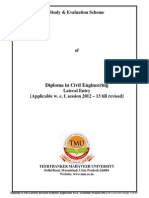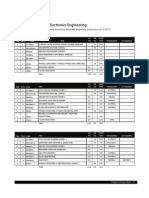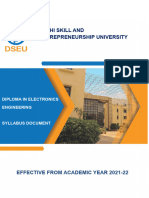B.sc. Electronics
B.sc. Electronics
Uploaded by
p27086819Copyright:
Available Formats
B.sc. Electronics
B.sc. Electronics
Uploaded by
p27086819Original Description:
Copyright
Available Formats
Share this document
Did you find this document useful?
Is this content inappropriate?
Copyright:
Available Formats
B.sc. Electronics
B.sc. Electronics
Uploaded by
p27086819Copyright:
Available Formats
DEVI AHILYA VISHWAVIDYALAYA, INDORE
SCHOOL OF ELECTRONICS
1. PROGRAMME CODE:EC4A
2. PROGRAMME TITLE:B Sc (Electronics)/B Sc (Computer Science)
3. OBJECTIVES
Graduates should be employable in industry, academia or government.
Graduates should be imparted necessary knowledge and leadership skills for a successful
professional career.
Graduates should learn to adapt in a world of constantly evolving and innovative technology.
Graduates should be enabled enough to collaborate with others to solve problems with
creative thinking and effective communication.
4. Combination:
The programme may have following combination
A. Electronics, Physics, Mathematics
B. Electronics, Computer Science, Mathematics
5. ELIGIBILITY
12th (10+2)with Science stream and Mathematics (compulsory) from a recognized Board with
minimum 50 % marks.
6. AGE LIMIT
As decided by the University or State Govt. for U.G. programmes
7. ADMISSION PROCEDURE
Admission will be done through Common Entrance Test (CET-2019).
8. SEATS:30(in each Combination : Refer4)
Course Total UR_ UR_F ST_O ST_ SC_O SC_F OBC_ OBC_ NRI PH JKR JKM EW
Seats OP P F P OP F
T NT
B.Sc. 30 9 5 4 2 3 2 3 1 1 1 1 1 1 1
UR_OP-Unreserved Open, UR_F-Unreserved Female, ST_OP-Scheduled Tribe Open, ST_F-Scheduled Tribe
Female, SC_OP-Scheduled Caste Open, SC_F-Scheduled Caste Female, OBC_OP-OBC Open, OBC_F-OBC
Female, NRI-Non Residing Indian, PH-Physically Handicapped, JKR-Jammu & Kashmir Resident, JKM-Jammu &
Kashmir Migrant, EWT-Employee Ward Teaching, EWNT-Employee Ward Non Teaching
9. DURATION:SixSemesters (Three Years)
B Sc/ B Sc (Electronics) Page 1
DEVI AHILYA VISHWAVIDYALAYA, INDORE
10.FEE STRUCTURE (2020-22)
Semester Academic Development Students’ Examination Total (Rs.)
Fee & Services Fee Fee
Maintenance Boys Girls Boys Girls
Fee
First 15000 7500 3300 3111 2500 28300 28111
Second 15000 7500 2911 2722 2500 27911 27722
Third 15000 7500 3300 3111 2500 28300 28111
Fourth 15000 7500 2911 2722 2500 27911 27722
Fifth 15000 7500 3300 3111 2500 28300 28111
Sixth 15000 7500 2911 2722 2500 27911 27722
In addition, students need to pay Caution money (Refundable) of Rs. 4000/- in First
Semester
If a student repeats a paper(s) in a semester, an additional fee of Rs.500/- per paper
shall be payable.
For NRI/ FN/ PIO Candidates, a fee of US$ 3500 Per Annum shall be payable on yearly
basis. They will have to pay a refundable deposit of US$ 500 once at the time of
admission.
Hostel & mess facility are available on chargeable basis which shall extra to the fee
mentioned above.
In addition, students are required to pay Alumni fee of Rs. 500/- per semester
11. Learning Outcomes:
Upon graduating, a student shall imbibe the following gaits:
1. An ability to apply knowledge of computing and mathematics in Electronics
2. An ability to analyze a problem, and identify and define the computing requirements
appropriate to its solution.
3. An ability to design, implements, and evaluate a computer-based system, process,
component, or program to meet desired needs.
12. Curricular Scheme (CBCS):
Following is the proposed indicative scheme for the B Sc/B Sc (Electronics) programme for
the Two combinations proposed. The courses shall be floated and opted based on Choice
Based Curriculum Scheme (CBCS) for the three combinations. Additionally, the
scheme/curriculum/Syllabi is subject to periodic revision
Semester I 26 Credits
Sr. Lecture Tutorial Practical Credi
Course Code Course Name
No. (L) Hr (T) Hr (P) Hr t
1 EL11101 Computer Organization 3 1 -- 4
2 EL11102 Mathematics 3 1 -- 4
3 EL11103 Components and Networks 3 1 -- 4
B Sc/ B Sc (Electronics) Page 2
DEVI AHILYA VISHWAVIDYALAYA, INDORE
4 EL11104 Foundation Course - Hindi Language 2 0 -- 2
5 EL11105 English Language 2 0 -- 2
6 EL11106 Entrepreneurship and Development-I 2 0 -- 2
7 EL11201 Computer Org. & MS Office Laboratory 0 0 2 2
8 EL11203 Electronics Laboratory 0 0 2 2
9 EL11401 Comprehensive Viva -- -- -- 4
Semester II 26 Credits
Sr. Lecture Tutorial Practical
Course Code Course Name Credit
No. (L) Hr (T) Hr (P) Hr
1 EL12101 Programming & Problem Solving through C. 3 1 -- 4
2 EL12102 Mathematics 3 1 -- 4
3 EL12103 Electronic Devices 3 1 -- 4
4 EL12104 Foundation Course - Hindi Language 2 0 -- 2
5 EL12105 English Language 2 0 -- 2
6 EL12106 Entrepreneurship and Development-II 2 0 -- 2
7 EL12201 C Language Laboratory 0 0 2 2
8 EL12203 Electronics Laboratory 0 0 2 2
9 EL12401 Comprehensive Viva -- -- -- 4
Semester III 26 Credits
Sr. Lecture Tutorial Practical
Course Code Course Name Credit
No. (L) Hr (T) Hr (P) Hr
1 EL13101 Data Structure using C Lang 3 1 -- 4
2 EL13102 Mathematics 3 1 -- 4
3 EL13103 Analog Electronics and OpAmp. 3 1 -- 4
4 EL13104 Foundation Course - Hindi Language 2 0 -- 2
5 EL13105 English Language 2 0 -- 2
6 EL13106 Environmental Studies-I 2 0 -- 2
7 EL13201 Data Structure using C Laboratory 0 0 2 2
8 EL13203 Electronics Laboratory 0 0 2 2
9 EL13401 Comprehensive Viva -- -- -- 4
Semester IV 26 Credits
Sr. Lecture Tutorial Practical
Course Code Course Name Credit
No. (L) Hr (T) Hr (P) Hr
1 EL14101 Data Base Management System 3 1 -- 4
2 EL14102 Mathematics 3 1 -- 4
3 EL14103 Digital Electronics 3 1 -- 4
4 EL14104 Foundation Course - Hindi Language 2 0 -- 2
5 EL14105 English Language 2 0 -- 2
6 EL14106 Environmental Studies-II 2 0 -- 2
7 EL14201 Data Base Management System Laboratory 0 0 2 2
8 EL14203 Electronics Laboratory 0 0 2 2
9 EL14401 Comprehensive Viva -- -- -- 4
Semester V 26 Credits
Sr. Lecture Tutorial Practical
Course Code Course Name Credit
No. (L) Hr (T) Hr (P) Hr
1 EL15101 Object Oriented Programming using C++ 3 1 -- 4
2 EL15102 Mathematics 3 1 -- 4
3 EL15103 Microprocessor and Interfacing 3 1 -- 4
4 EL15104 Foundation Course - Hindi Language 2 0 -- 2
B Sc/ B Sc (Electronics) Page 3
DEVI AHILYA VISHWAVIDYALAYA, INDORE
5 EL15105 English Language 2 0 -- 2
6 EL15106 Basics of Computer & IT-I 2 0 -- 2
7 EL15201 C++ Laboratory 0 0 2 2
8 EL15203 Electronics Laboratory 0 0 2 2
9 EL15401 Comprehensive Viva -- -- -- 4
Semester VI 28 Credits
Practic
Sr. Lecture Tutorial
Course Code Course Name al Credit
No. (L) Hr (T) Hr
(P) Hr
1 EL16101 Computer Networks 3 1 -- 4
2 EL16102 Mathematics 3 1 -- 4
Electronics Communication and
3 EL16103 3 1 -- 4
Instrumentations
4 EL16104 Foundation Course - Hindi Language 2 0 -- 2
5 EL16105 English Language 2 0 -- 2
6 EL16106 Basics of Computer & IT-II 2 0 -- 2
7 EL16201 Computer Networks Laboratory 0 0 2 2
8 EL16203 Electronics Laboratory 0 0 2 2
9 EL16501 Internship (Project) 2 2
10 EL16401 Comprehensive Viva -- -- -- 4
Note: The above course contents/scheme can be modified as per requirement from time to
time in accordance with University Ordinance No. 14.
13. PROGRAMME OUTCOMES
PO aims at to create an educational environment to mould the students to meet the challenges of
modern Electronics & Communication industry through state of the art technical knowledge and
innovative experimental approaches. Following are the expected programme outcomes.
1. Analyze , plan and apply the acquired knowledge in basic sciences and
mathematics in solving Electronics and Communication Engineering problems with
technical, economic, environmental and social contexts.
2. Design, build and test analog & digital electronic systems for given specifications.
3. Architect modern communication systems to meet stated requirements.
4. Work in a team using technical knowhow, common tools and environments to achieve
project objectives.
5. Communicate effectively, demonstrate leadership qualities and exhibit professional
conduct in their career.
6. Engage in lifelong learning, career enhancement and adapt to changing professional and
societal needs.
7. In addition the course caters to the requirements of providing complete exposure to
NET/SET syllabus for Electronics farmed by the U.G.C.
B Sc/ B Sc (Electronics) Page 4
DEVI AHILYA VISHWAVIDYALAYA, INDORE
14. JOB OPPORTUNITIES
Ability for employment
1. Internship: Students may serve as internee in manyElectronics and communication
industriesfor completion of six month project work.
2. Placement
(a) As R &D Design Engineer in the Electronics domain
(b) As system engineer in telecommunication industry
Ability creation for pursuing higher education and research in the areas of Electronics
B Sc/ B Sc (Electronics) Page 5
You might also like
- 2014 Full Book Qualitative Research Methodologies For Occupational Science and TherapyDocument255 pages2014 Full Book Qualitative Research Methodologies For Occupational Science and TherapyRicardo Ortega100% (1)
- B.Tech - EEE - 2012 - (C)Document157 pagesB.Tech - EEE - 2012 - (C)Kumar VaibhavNo ratings yet
- EntrepreneurDocument6 pagesEntrepreneurReshaDaSeaMaiden100% (1)
- IR6001 SyllabusDocument19 pagesIR6001 SyllabusPeng AnNo ratings yet
- Syllabus Diploma Civil Lateral 2012-13Document64 pagesSyllabus Diploma Civil Lateral 2012-13iamaashuNo ratings yet
- Extc Sem6 SyllabusDocument50 pagesExtc Sem6 SyllabusVIRENDRA KUMAR SAHUNo ratings yet
- EEE_II_year_BE_2024-25Document42 pagesEEE_II_year_BE_2024-25chandupavanz12No ratings yet
- DT080 Student HandbookDocument49 pagesDT080 Student HandbookDermot ClarkeNo ratings yet
- 11 ElectronicsEng SemesterI 2023-24Document42 pages11 ElectronicsEng SemesterI 2023-24ak9935244226No ratings yet
- Syllabusbtechelectrical PDFDocument140 pagesSyllabusbtechelectrical PDFneeraj dasNo ratings yet
- Be Electronics & CommunicationsDocument120 pagesBe Electronics & CommunicationsMahesh PremaniNo ratings yet
- B.SC CS 2022-2025 Upto VI SemesterDocument189 pagesB.SC CS 2022-2025 Upto VI SemesterMv arun 2005No ratings yet
- Te Be-Extc Cbcgs SyllabusDocument219 pagesTe Be-Extc Cbcgs SyllabusAishwarya PatangeNo ratings yet
- ImportantDocument14 pagesImportantbhosdisirNo ratings yet
- Bachelor of Science in Electronics EngineeringDocument7 pagesBachelor of Science in Electronics EngineeringDean MoisesNo ratings yet
- EXTC Sem V-MinDocument47 pagesEXTC Sem V-MinVishnu PatilNo ratings yet
- VF - Sem II - Diploma in Electronics Engineering - 2021 22.docx 1 1 13Document13 pagesVF - Sem II - Diploma in Electronics Engineering - 2021 22.docx 1 1 13lovekumar152007No ratings yet
- وصف البرنامج الاكاديمي قسم الالكترونيك والاتصالات 1Document111 pagesوصف البرنامج الاكاديمي قسم الالكترونيك والاتصالات 1العراقيNo ratings yet
- CSE BrochureeDocument36 pagesCSE Brochureeriduwanrisha1971No ratings yet
- NITRR SyllabusDocument77 pagesNITRR SyllabusDeepak Kumar RaiNo ratings yet
- ProspectusDocument35 pagesProspectusチユアナxenoNo ratings yet
- UGProgramDocument3 pagesUGProgramVasundhara ChandraNo ratings yet
- Department of Electronics and Instrumentation Engineering: Academic Year - (2019-20)Document51 pagesDepartment of Electronics and Instrumentation Engineering: Academic Year - (2019-20)Karee MullahNo ratings yet
- ECE Syllabus FinalDocument45 pagesECE Syllabus FinalShachi P GowdaNo ratings yet
- CAPS Electrical Tech Final Bleed and CropsDocument120 pagesCAPS Electrical Tech Final Bleed and CropsVincent Don KasambalaNo ratings yet
- Lab Manual ADE FinalDocument39 pagesLab Manual ADE FinalNithiyaNo ratings yet
- VF - Sem II - Diploma in Electrical Engineering - VF - 2021 22.docx 1 1 9Document9 pagesVF - Sem II - Diploma in Electrical Engineering - VF - 2021 22.docx 1 1 9MD NADEEMNo ratings yet
- Course Curriculum For EEEDocument51 pagesCourse Curriculum For EEEShakik AhammodNo ratings yet
- SYIT BTech 2020 PatternDocument46 pagesSYIT BTech 2020 Patternflight5703No ratings yet
- Batch Course Booklet SoEE Detailed Complete DocxDocument43 pagesBatch Course Booklet SoEE Detailed Complete DocxJeet DoleNo ratings yet
- Scheme 2024 B.Tech ECEDocument14 pagesScheme 2024 B.Tech ECESourabh KumarNo ratings yet
- Final Year E&TC Syllabus Wef 2023-24Document43 pagesFinal Year E&TC Syllabus Wef 2023-24satish.maliNo ratings yet
- Selection Round Will Be On Different Dates in Different CitiesDocument12 pagesSelection Round Will Be On Different Dates in Different CitieslekhakbikrantNo ratings yet
- Madanapalle Institute of Technology & Science: Madanapalle (Ugc-Autonomous) WWW - Mits.ac - inDocument41 pagesMadanapalle Institute of Technology & Science: Madanapalle (Ugc-Autonomous) WWW - Mits.ac - inShanmuga KumarNo ratings yet
- Srmuniv - Ac.in Sites Default Files Files Btech Syll Elec-Instru r2013-14Document176 pagesSrmuniv - Ac.in Sites Default Files Files Btech Syll Elec-Instru r2013-14GaacksonNo ratings yet
- BE ElectronicsDocument57 pagesBE Electronicsvinod_patil4607No ratings yet
- CurriculumDocument21 pagesCurriculumhashmalikac.ip.23No ratings yet
- Lab Manual ADE FinalDocument40 pagesLab Manual ADE FinalNithiyaNo ratings yet
- Syllabus Course Itt470 - Digital Electronics - LatestDocument8 pagesSyllabus Course Itt470 - Digital Electronics - LatestjuNo ratings yet
- B Tech ECE CreditsDocument5 pagesB Tech ECE CreditsGokulNo ratings yet
- Electrical Estimation and CostingDocument23 pagesElectrical Estimation and CostingPoojaym PoojaNo ratings yet
- Gju Study Plan - Bida Business Intelligence and Data Analytics v5Document31 pagesGju Study Plan - Bida Business Intelligence and Data Analytics v5batman.2005.majNo ratings yet
- Electronics Sem III IV C Scheme Syllabus 13062020Document76 pagesElectronics Sem III IV C Scheme Syllabus 13062020Keiran LeeNo ratings yet
- Screenshot 2024-11-27 at 10.31.14 AMDocument44 pagesScreenshot 2024-11-27 at 10.31.14 AMSukhpal SinghNo ratings yet
- Ece II Year IV Sem 2020-2021Document115 pagesEce II Year IV Sem 2020-2021Avan CruzzNo ratings yet
- Panjab University, Chandigarh-160014 (India) (Estd. Under The Panjab University Act VII of 1947-Enacted by The Govt. of India)Document175 pagesPanjab University, Chandigarh-160014 (India) (Estd. Under The Panjab University Act VII of 1947-Enacted by The Govt. of India)Hassan KhanNo ratings yet
- Programmes 'O'-Level 'A'-LevelDocument8 pagesProgrammes 'O'-Level 'A'-LevelMukesh BishtNo ratings yet
- Kra3 A 1 1Document42 pagesKra3 A 1 1Rene CabahugNo ratings yet
- Syllabusbtechec1 PDFDocument107 pagesSyllabusbtechec1 PDFAmol AmollNo ratings yet
- A Constituent College of Siddhartha Academy of Higher Education, TumakuruDocument42 pagesA Constituent College of Siddhartha Academy of Higher Education, TumakuruRoyal ClashNo ratings yet
- CS Stream V8Document86 pagesCS Stream V8yogeesh2006rNo ratings yet
- MIP1501 Final Oct-Nov 23 - Main ExamDocument7 pagesMIP1501 Final Oct-Nov 23 - Main Examkhizraakhan15No ratings yet
- IT 11 Electronics 1Document9 pagesIT 11 Electronics 1John CedrickNo ratings yet
- Math112a Calculus 2 SyllabusDocument6 pagesMath112a Calculus 2 SyllabusJholo BuctonNo ratings yet
- University of Calicut (Abstract) : Section OfficerDocument29 pagesUniversity of Calicut (Abstract) : Section OfficerGta SaNo ratings yet
- III Mh Adc Lab (b20es0303) ManualDocument92 pagesIII Mh Adc Lab (b20es0303) ManualarunjnairyNo ratings yet
- 1701797825BE AIML 2022 23 I&II Semister - Final PDFDocument38 pages1701797825BE AIML 2022 23 I&II Semister - Final PDFsuhasreddykatkNo ratings yet
- SHS DLL Q2 - w8Document6 pagesSHS DLL Q2 - w8MELAIDA CASTANAR GARIBAYNo ratings yet
- Syllabusdiplomaelectrical PDFDocument93 pagesSyllabusdiplomaelectrical PDFramaNo ratings yet
- Syllabus UOMDocument9 pagesSyllabus UOMKhemraj MahadewNo ratings yet
- Madanapalle Institute of Technology & ScienceDocument40 pagesMadanapalle Institute of Technology & ScienceRavikanth NssNo ratings yet
- Computer Science Teacher: Insight into the computing classroomFrom EverandComputer Science Teacher: Insight into the computing classroomNo ratings yet
- Teaching Electrostatics: A Teacher's Resource for Increasing Student EngagementFrom EverandTeaching Electrostatics: A Teacher's Resource for Increasing Student EngagementNo ratings yet
- Lesson Plan Format 4Document4 pagesLesson Plan Format 4api-352906038No ratings yet
- Lenv62022 SKDocument2 pagesLenv62022 SKsamantha jacomeNo ratings yet
- Literary Criticism - Feminism (Mulan 2020)Document13 pagesLiterary Criticism - Feminism (Mulan 2020)Nita Marada100% (1)
- Contoh ResumeDocument4 pagesContoh ResumeJambu Hijau DboyzNo ratings yet
- Eng 101 - Language, Culture, and SocietyDocument8 pagesEng 101 - Language, Culture, and SocietyMacellyBudionganNo ratings yet
- Knowledge and Inquiry: An Introduction To Epistemology: January 2006Document29 pagesKnowledge and Inquiry: An Introduction To Epistemology: January 2006Kathlyn PlacenteNo ratings yet
- Form ADocument5 pagesForm AMuhammad SaqibNo ratings yet
- VN10424502354 24 04 2024 EtrfDocument1 pageVN10424502354 24 04 2024 Etrftranminhanh2407No ratings yet
- Personal StatementDocument3 pagesPersonal StatementSurekha Bhanage PatilNo ratings yet
- Step 1 230s - Step 2 273 Write-Up - Step2Document2 pagesStep 1 230s - Step 2 273 Write-Up - Step2lashaNo ratings yet
- Continuous Improvement Plan (2020-2021) : Narrative - Template Part 1 - Option BDocument6 pagesContinuous Improvement Plan (2020-2021) : Narrative - Template Part 1 - Option BAnj De GuzmanNo ratings yet
- Raduate Ngineer Rainee (Get) : Kirloskar Brothers Limited Application Form ForDocument4 pagesRaduate Ngineer Rainee (Get) : Kirloskar Brothers Limited Application Form Forgren900No ratings yet
- Course: Life and Works of Rizal: Sand Course Intended Learning RoutcomeDocument15 pagesCourse: Life and Works of Rizal: Sand Course Intended Learning RoutcomeDaryl HilongoNo ratings yet
- The Institutionalization of Knowledge: Doug OgilvieDocument2 pagesThe Institutionalization of Knowledge: Doug OgilvieashurieNo ratings yet
- Kai Diez-Fugitt - Resume 2023Document1 pageKai Diez-Fugitt - Resume 2023api-426148669No ratings yet
- Summer Internship On Image Processing Intellectz11Document3 pagesSummer Internship On Image Processing Intellectz11api-402796743No ratings yet
- PPTDocument9 pagesPPTDelsie FalculanNo ratings yet
- February 2012 International Line NewsletterDocument3 pagesFebruary 2012 International Line NewsletterChandika AnnasiwattaNo ratings yet
- MechschDocument11 pagesMechschvasavik.eeeNo ratings yet
- Aneri Arunbhai Kristi SOPDocument3 pagesAneri Arunbhai Kristi SOPBhavesh NarayaniNo ratings yet
- Flinnfax 2012-4 Chemistry FLRDocument8 pagesFlinnfax 2012-4 Chemistry FLRSiêu Nhân Kem XôiNo ratings yet
- Types of Visual CommunicationDocument2 pagesTypes of Visual CommunicationCharielyTamparongNo ratings yet
- Zari Johnson Resume 2018 1Document2 pagesZari Johnson Resume 2018 1api-401775320No ratings yet
- Database - EuropeDocument14 pagesDatabase - EuropeShanayaNo ratings yet
- Get History: An Introduction to Theory, Method and Practice, 3rd Edition Peter Claus & John Marriott PDF ebook with Full Chapters NowDocument50 pagesGet History: An Introduction to Theory, Method and Practice, 3rd Edition Peter Claus & John Marriott PDF ebook with Full Chapters Nowoneelvannigo100% (3)
- 10-Ә БЖБ 2Document2 pages10-Ә БЖБ 2Зилола СултановаNo ratings yet
- Naskah Pidato Bahasa InggrisDocument2 pagesNaskah Pidato Bahasa Inggrisrokhman mahfud100% (1)

























































































